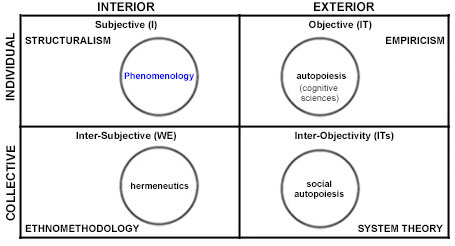Phenomenology
Phenomenology is an interpretative methodology that studies the structures of
consciousness as experienced from the first-person point of view. The experience, along with
enabling conditions, is directed toward an object by virtue of its content or meaning (which represents the
object). Phenomenology is not a theory, not a system of thought nor a philosophical position. It is a
method.
Continental philosophers (Germany, France) have
carried on the interpretive aspects of philosophy whereas the dominate English-speaking philosophers (Britain,
North America) have typically shunned interpretative aspect and focused mostly on pragmatic and
empiric analytic studies. Another type of interpretative methodology is Hermeneutics which chiefly focuses on
the interpretation of biblical texts, wisdom literature, and philosophical texts.
The visual diagram below illustrates the
trajectories of philosophical traditions from the 17th-century to the 19th-century (with importance of Immanuel
Kant).

The Empirical tradition of English-speaking
philosophers (Bacon,
Locke,
Berkeley, Hume)
grew into what is called phenomenology – largely represented in the writings of Auguste Comte, John Stuart Mill
and Ernest
Mach. Phenomenology is a reaction against mechanistic science which tells us about appearances
but not reality. It is a radical form of empiricism in that physical objects cannot justifiably be said to exist
in themselves – that physical objects are mind-dependent. Phenomenology as an ontological view of the nature of
existence can be traced back to Berkeley and his subjective idealism.
Phenomenology's general theme: scientific
criteria or the scientific method should be used in exploring, observing and judging
human knowledge. and human societal structures. The social scientist is not concerned about molecules,
atoms and electrons, but beings living, acting and thinking within a social structure.
Idealism general theme: look at reality through
the lens of human self-awareness or of the human spirit with creative
freedom. Phenomenology can also exist in 'Idealism' realm – testimony to the claim that
phenomenology is ‘more developed, more complex’ (see Transcendental Phenomenology).
Phenomenalism vs.
Phenomenology
Phenomenalism is not Phenomenology. An -ism is a position, a feeling, a belief.
Phenomenalism is ‘all we know are appearances'. An 'ology is the study of, a science of a subject. A methodological
thing. Phenomenology is the study of phenomena, but not saying that only phenomena can be
known.
AQAL Map
Using Integral
Theory's AQAL map provides a visual tool to assist in understanding Phenomenalism. Since
Phenomenalism claims that that physical objects are reduced to mental objects, it exists in the
Individual-Subjective or Upper Left (UL) quadrant.

Over time phenomenology divided into several camps including
existential and transcendental phenomenalism.
Transcendental Phenomenology
(TPh)
Emmanuel Kant started transcendental philosophy; however it was Edmund Husserl
(1859-1938) who refined phenomenology as transcendental-idealist philosophy – similar in many ways to Kant’s
Transcendental
Idealism (the nuances of the differences is fertile ground for high academic debate and
reflection). Husserlian Transcendental Phenomenology is "the reflective study of the essence of
consciousness as experienced from the first-person point of view." TPh takes the intuitive experience of
phenomena as its starting point and then to study experience without reference to assumptions posited by
experience. Husserl is considered to be the founder of transcendental phenomenology,
An interesting ‘clock & dagger’ story begins after the death of Husserl whose
students were alarmed with the Nazis intent to destroy his writings since he was Jewish. Before the Nazis arrived
Husserl’s manuscripts (approximately 40,000 pages) and his complete research library were smuggled to the Roman
Catholic University of Louvain in Belgium by the Franciscan priest Herman Van Breda. The university became home to
the Husserl-Archives of the Higher Institute of Philosophy and a major center for phenomenology
studies.
Transcendental phenomenologists: Edmund Husserl
(1859-1938), Amadeo Giorgi
Existential
Phenomenology
Philosophy must begin from experience but argues for the temporality of
personal existence as the framework for analysis of the human condition. Temporality as opposed to a higher
non-temporal state of
eternity, which is co-extensive with the infinite and eternal now of God (no time on ‘The
Other Side’). A "primordial" or "original" time that it is finite. It comes to an end in death. Existential
phenomenology differs from transcendental phenomenology by its rejection of the transcendental
ego.
Existential phenomenologists: Martin
Heidegger (1889–1976), Hannah Arendt (1906–1975), Emmanuel Levinas (1906–1995), Gabriel Marcel (1889–1973),
Jean-Paul Sartre
(1905–1980), Paul Ricoeur (1913–2005) and Maurice Merleau-Ponty (1908–1961).
Extreme
Phenomenalism
In the late 19th century, an extreme form of phenomenalism was formulated by Austrian
physicist Ernst Mach, later developed and refined by the Logical
Positivists. Mach rejected the existence of God and denied that
phenomena were data experienced by the mind or consciousness of subjects. He held the view that sensory
phenomena were "pure data" whose existence is anterior to any arbitrary distinction between mental and physical
categories of phenomena.
Anti-Phenomenalism
Recent academic research (2017) claims that phenomenalist interpretations of Kant are
out of fashion. The most common complaint from anti-phenomenalist critics is that a phenomenalist reading of Kant
would collapse Kantian idealism into Berkeleyan idealism.
Math and logic are problematic for they are independent of sensory verification (one answer is to
consider them conventions of language). Also, ethical (right &
wrong) and aesthetic (beauty) statements are
neither true nor false because they could not be verified (conflicts with the Verification Principle, a
philosophical doctrine fundamental to the school Logical Positivism).
Ironically, one criticism points out that the
verification principle itself is not - by its own criteria - meaningful. It is not an analytic truth (a 'convention
of language') and neither is there any possible or actual sense experience that could be said to verify
it.
Last Word
The various camps of phenomenology take various positions on whether we live in a
spiritual or mental universe. There are possible perceptions of objects
which are never perceived - although they are capable of being so. Can one have ‘ESNP’? – Extra Sensory
Non-Perception. How does the phenomenologist answer the koan problem in
which a tree falls in the forest where no one is around and one is asked, “does it make a noise?” or “does a rainbow exist
if no one is around to see it?”. The Berkeleyan answer is alluded to in the following
poem:
There was a young man who
said
“God, I find it extremely odd
that a tree as a tree simply ceases to be
when no one is around in the quad.”
“Young man your astonishment’s
odd.
I am always in the quad.
So the tree as a tree never ceases to be
Since observed by yours faithfully – God”
| 
